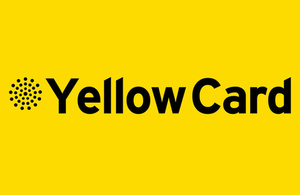Drug reaction reporting scheme now more accessible to healthcare professionals
A new software functionality piloted in Nottinghamshire means healthcare professionals can now report suspected adverse drug reactions directly to the Medicines and Healthcare products Regulatory Agency.

YellowCard
This new functionality, enabled by risk management software supplier Ulysses, is a big step forward in making the Medicines and Healthcare products Regulatory Agency (MHRA’s) Yellow Card Scheme more accessible to healthcare professionals, especially those in secondary healthcare settings.
Reports of suspected side effects or ‘adverse drug reactions’ (ADRs) from medicines to the Yellow Card Scheme is vital in helping the MHRA monitor the safe use of medicines in the UK to ensure they are acceptably safe for patients and users.
The Ulysses risk management software allows healthcare providers’ clinical systems to integrate with the Yellow Card system for direct reporting, meaning adverse reaction or medication error reporting from hospitals and trusts is now easier than before.
Nottinghamshire Healthcare NHS Foundation Trust are the first to pilot this new integrated reporting across nearly 200 of their healthcare sites, where it is hoped the new software and increased accessibility will increase reporting of ADRs.
Implementing Yellow Card reporting functionality into clinical systems has previously resulted in increased ADR reporting, with over 37,700 suspected ADR reports from clinical systems received by the MHRA between 2010, when Yellow Card reporting of suspected ADRs was introduced into the first clinical system, and the end of August 2017.
Increased ADR reporting enables the MHRA to carry out one of its core functions of monitoring the safe use of medicines in the UK and is used alongside other safety information to identify possible drug safety issues promptly and protect public health.
MHRA’s Vigilance and Risk Management of Medicines’ Head of Pharmacovigilance Strategy, Mick Foy, said:
This is a great step forward for patient safety. Healthcare professionals, along with the public, provide us with important information on the safety and effectiveness of medicines and medical devices via our Yellow Card Scheme.
The more reports we receive the better, and we encourage anyone – patient, carer or healthcare professional – to report any suspected adverse reaction to our Yellow Card reporting system.
A good reporting culture is a sign of good patient safety practice within an organisation and we hope the pilot will encourage other healthcare providers to use our Yellow Card Scheme and contribute to improved UK drug safety monitoring.
Ulysses Director, Jenny Pearce, said:
With patient safety in mind, Ulysses is pleased to be the first and only supplier of local risk management software systems allowing healthcare professionals to report suspected ADRs directly to the MHRA.
Working very closely with the MHRA, we recognise the importance of reporting ADRs and how Ulysses makes it easier for busy healthcare professionals to report within the system they already use.
Nottinghamshire Healthcare NHS Foundation Trust’s Incident & Risk Systems Manager, Matthew Ellis, said:
We are pleased to be the first to pilot the reporting of suspected adverse drug reactions to the MHRA using this new software.
It means that for the first time we will be able to gain a better understanding of the extent of ADRs across our trust sites, take measures to prevent future harm to our patients, and share the information with MHRA promptly for national analysis of any potential issues.
Ends
Notes to Editor
- The Yellow Card Scheme collates and reviews reports of suspected adverse drug reactions on all licensed and unlicensed medicines and vaccines. It includes those issued on prescription as well as those bought over the counter from a pharmacist or supermarket. The Yellow Card Scheme is MHRA’s system of monitoring the safety of medicines in the UK and it acts as an early warning system to identify new and strengthen existing safety information about medicines. Yellow Cards are used alongside other scientific safety information to help MHRA to take action, if necessary, to make changes to the warnings given to people taking a medicine or review the way the medicine is used to maximise benefit and minimise the risk to the patient.
- The Yellow Card Scheme also collects information on suspected problems or incidents online for medical device adverse incidents, defective medicines (those that are not of an acceptable quality), counterfeit or fake medicines or medical devices and safety concerns for e-cigarettes or their refill containers (e-liquids).
- In 2017, 35% (7,564) of direct reports by healthcare professionals were received from clinical systems such as SystmOne and Vision for GPs, and via MiDatabank for hospital pharmacists. GP reports via clinical systems accounted for 72% (4,717 reports) of all reports from GPs and 27% (913 reports) of hospital pharmacy reports.
- As part of the requirements under the NHS GP Systems of Choice Programme (GPSoC), EMIS, the largest GP systems supplier, is also working with MHRA to integrate reporting this is anticipated to have a significant increase in ADR reporting.
Media enquiries
News centre
MHRA10 South Colonnade
London
E14 4PU
Email newscentre@mhra.gov.uk
Telephone (including out of hours): 020 3080 7651